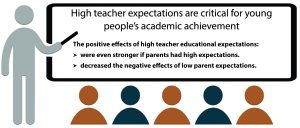Reprinted from The University of Texas at Austin Population Center December 2021
The United States’ educational system has long struggled with racial/ethnic and socioeconomic achievement gaps among its students. Students of color and those from lower-income backgrounds often have poorer academic attainment compared to White students and those from higher-income families. Lower levels of completed education are related to a host of negative outcomes in people’s lives, including higher rates of poverty and incarceration. Moreover, educational achievement gaps contribute to socioeconomic disadvantages that persist across generations.
Understanding the processes that could reduce disparities in academic achievement are critical to improving educational practice.
Adults’ expectations for the educational futures of youth strongly influence how well the youth do academically. Low teacher expectations and bias – that is, teachers holding lower expectations than would be expected given a student’s prior achievement levels – are linked to young people’s poorer grades, lower achievement test scores, and a lower chance of graduating from high school. Conversely, parents’ high expectations are linked to youth’s academic achievement, grades, college attendance and completion. However, less is known about how teachers’ and parents’ expectations come together – particularly if the expectations do not align – to influence young people’s educational success.
In addition, adults’ expectations may influence the interactions and supports they provide to youth. For example, parents with high educational expectations for their adolescents may be more likely to volunteer at the school or participate in parent-teacher conferences. On the other hand, parents with low educational expectations for their adolescents may recognize their adolescents’ academic struggles and engage in frequent communication with the school in response to the academic challenges their children experience. These interactions between students and important adults may, in turn, either promote or hinder students’ achievement as well as students’ academic self-concept, or perceptions of their ability to attain academic success.
The authors use data from the Education Longitudinal Study, a large, nationally‐representative sample of students who were high school sophomores in 2002. The students were again interviewed in 2006 to measure their educational attainment four years later. Educational expectations were measured by asking parents and math teachers to report the highest level of education they expected the student to complete on a continuum ranging from less than high school to an advanced degree.
This research brief reports on a recent study1 in which the authors investigated similarities and differences in parents’ and teachers’ educational expectations and how they may shape young people’s academic outcomes. They also explored whether measures of family-school connections and student academic self-concept served as mechanisms through which parent and teacher expectations influence later academic success. Finally, they examine whether variations existed in the relationships between adult expectations, family-school connections, and academic outcomes by students’ race and socioeconomic status.
KEY FINDINGS
High teacher expectations are critical for young people’s academic achievement (see Figure)
- Teachers’ educational expectations for students were more strongly linked to adolescents’ educational success than parents’ expectations.
- The positive effects of high teacher educational expectations:
- were even stronger if parents had high expectations.
- decreased the negative effects of low parent expectations.
Students’ race/ethnicity mattered in some cases
- White students experienced greater benefits from high parent expectations than did Black, Latinx, or Asian American students.
- For Asian American students, having a teacher with high educational expectations lessened the negative effects of low parent expectations.
Higher socioeconomic students benefited more from high parental expectations
- Students from high socioeconomic backgrounds experienced greater benefits from high parent expectations than did students from lower socioeconomic backgrounds.
Lower adult expectations were linked to greater parent-school communication
- This is important because greater parent-school communication was linked to lower student grade point averages.
Two main family-school pathways describe how adult educational expectations operated
- Higher teacher and parent expectations were both linked to greater levels of parents’ involvement at school, which boosted students’ academic self-concept and subsequent educational success.
- In addition, when teachers had higher educational expectations for the student, they formed closer student-teacher connections, which promoted higher grade point averages.
Policy Implications
High teacher expectations and strong student–teacher relationships are crucial for improving youth academic achievement. Improving educational expectations that teachers hold for all students has the potential to greatly assist youth who are often marginalized in educational settings. Therefore, providing teachers with the tools to create classrooms where high expectations are the norm for all is likely a crucial means for improving student achievement. In addition, these interventions could also integrate methods for encouraging parents to enact more effective home‐based involvement strategies and providing accessible and welcoming opportunities for parents of marginalized students to be involved at school. Such work is crucial for ensuring the educational well‐being of all students.
Reference
1Benner, A.D., Fernandez, C.C., Hou, Y., & Gonzalez, C.S. (2021). Parent and teacher educational expectations and adolescents’ academic performance: Mechanisms of influence. Journal of Community Psychology 49:2679-2703. DOI: 10.1002/jcop.22644
Suggested Citation
Benner, A.D., Fernandez, C.C., Hou, Y., & Gonzalez, C.S. (2021). How do teachers’ and parents’ expectations come together to influence adolescents’ educational success? PRC Research Brief 6(12). DOI: 10.26153/tsw/17720.
About the Authors
Aprile D. Benner, abenner@prc.utexas.edu is an associate professor in the Department of Human Development and Family Sciences (HDFS) and a faculty scholar in the Population Research Center at UT Austin; Celeste C. Fernandez is a PhD student in HDFS and a PRC graduate student trainee; Yang Hou is an assistant professor of family sciences at the University of Kentucky; and Chelsea Smith Gonzalez is a senior analyst at Atlassian.


Comments